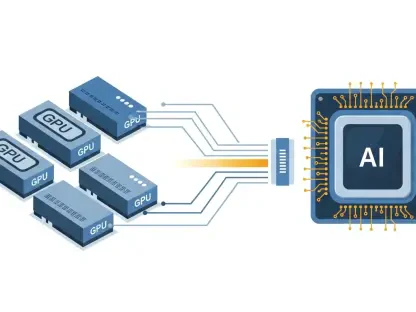The eminence of Artificial Intelligence (AI) as a pivotal force in the evolution of sustainable economies cannot be overstated. As AI permeates various facets of our lives, its transformative power is remodeling key sectors that underpin the economy. Through improved efficiency, reductions in costs, and generation of new opportunities, AI technologies are set to fundamentally alter healthcare, finance, professional development, and environmental sustainability.
The Healthcare Revolution Through AI
Economic Impact and Productivity Gains
AI presents a transformative opportunity for the healthcare industry, with the adoption of AI-driven self-care products touted to potentially reduce global healthcare expenses by a staggering USD 119 billion annually. This monetary windfall is complemented by a projected accrual of 41 billion days in recovered productivity, owing to the heightened efficiency and efficacy of healthcare delivery. By empowering individuals to manage their health proactively, AI reshapes the conventional paradigms of care, leading to economic and social benefits on a global scale.
Advancements in Diagnostics and Drug Development
In the realm of diagnostics, AI’s extraordinary capabilities are revolutionizing the accuracy of disease detection, particularly with challenging conditions such as cancer. Enhanced precision in diagnostics is not only life-saving but also cost-effective as it enables timely and targeted treatment. Furthermore, in drug development, AI expedites the R&D process via sophisticated simulations and patient identification protocols. This acceleration is vital in reducing the time-to-market for essential medications and treatments, thereby potentially saving millions of lives.
Financial Inclusion and Growth
Banking Access in Emerging Markets
AI is reshaping financial services by extending banking resources to previously unbanked populations in emerging markets. This inclusion fosters economic stability and growth as more individuals harness the power of financial tools for business and personal uses. The proliferation of AI in these markets is dissolving the traditional barriers to financial services, offering a ladder to economic upliftment and societal advancement.
Innovations in Insurance and Retirement
The advent of AI is also transforming insurance and retirement solutions, with AI-enabled products emerging to cater to the ascending middle classes in developing economies. These solutions are attuned to demographic shifts, offering more personalized coverage and investment strategies. As life expectancies extend and retirement paradigms shift, AI is positioned to underpin the sustainability of these critical financial safety nets.
Democratizing Professional Development
AI in Learning and Recruitment
AI’s transformative potential is palpable in the sphere of professional development. Digital technologies enable personalized and high-quality learning, which, in turn, unlocks new opportunities for individuals across different socioeconomic backgrounds. Moreover, AI-powered recruitment tools are revolutionizing how talent is sourced and matched to opportunities, democratizing access to career progression and success.
Childcare and Workforce Reintegration
Equally important is AI’s impact on childcare, offering affordable solutions that bolster parents’ ability to reintegrate into the workforce. This support is crucial, particularly for women, in balancing family and professional aspirations. By reinforcing societal structures through enhanced childcare support, AI directly contributes to economic productivity and social well-being.
Environmental Sustainability Through AI
Optimizing Renewable Energy Sources
AI’s imprint on environmental sustainability is evident in the optimization of renewable energy sources such as wind turbines. With AI, these turbines can be finely tuned for maximum clean electricity generation, facilitating a pivot towards greener power sources. AI also aids in driving energy efficiency in sectors intrinsic to our carbon footprint, like transportation and buildings, reducing greenhouse gas emissions and fostering a more sustainable future.
Agriculture and Weather Forecasting Innovations
In agriculture, AI-powered weather forecasting is proving invaluable. With more precise predictions, farmers can make informed decisions that lead to improved agricultural efficiency and productivity. In times of extreme weather, accurate forecasts are lifesaving, enabling preemptive measures to protect both crops and communities, underscoring AI’s crucial role in environmental and economic resilience.
Navigating the Challenges of AI Integration
Risks and Ethical Considerations
AI undoubtedly brings risks such as the propagation of disinformation and deepfakes, which pose significant threats in the digital age. Alongside, job displacement and the potential for ingrained biases in AI algorithms remain pressing concerns. Addressing these requires robust ethical frameworks and vigilance in the development and deployment of AI technologies to prevent harm and safeguard societal values.
Environmental and Computational Costs
AI’s demand for energy, both computational and operational, has an ecological footprint that needs scrutiny. Data centers that power AI consumed between 0.9% to 1.3% of global electricity in 2020, highlighting the environmental cost of AI’s growth. However, optimism lies in AI’s recursive ability to refine its energy management, signaling a promising horizon where AI could offset the environmental costs it incurs.
AI as a Catalyst for Sustainable Development
The potential of AI to herald a new era of sustainable growth across diverse industries is irrefutable. The sophisticated capabilities of AI models promise breakthroughs that can revolutionize healthcare, finance, education, and environmental stewardship. However, this boundless potential necessitates astute regulation and ethical considerations. In recognizing AI as both a beacon of progress and a progenitor of complex challenges, a cautious yet forward-looking approach becomes essential. With foresight and responsibility, AI’s dual nature can be balanced to unlock its full capabilities for the benefit of society and our planet.









